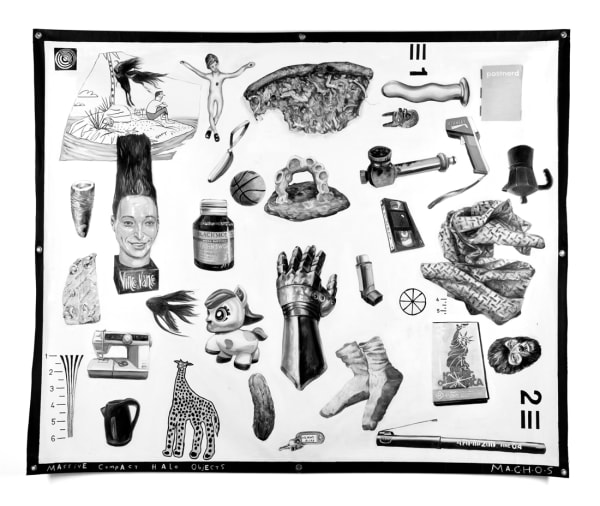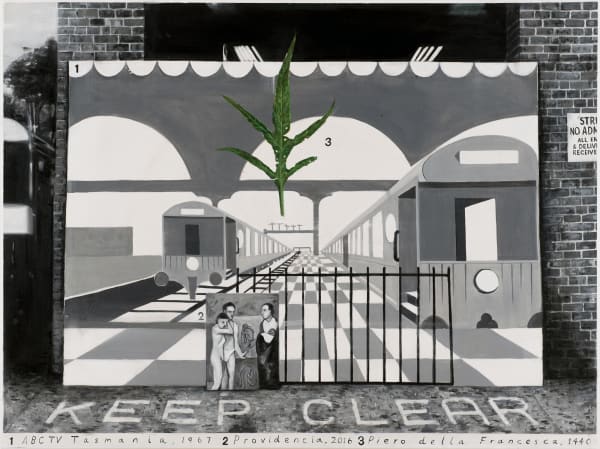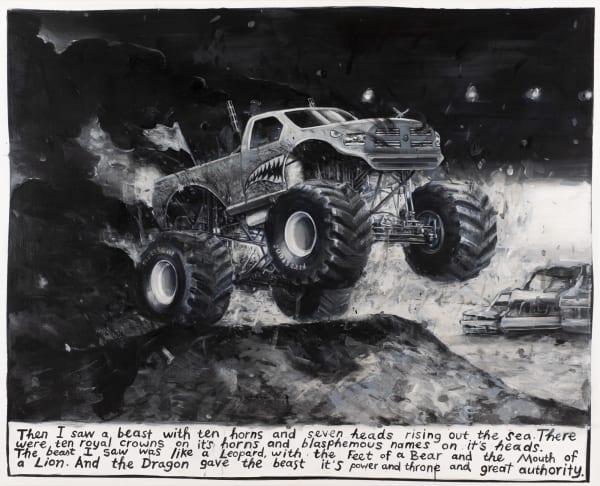Iconotropy
A few years ago, somebody with a permanent marker wrote the words, “Question everything!” on a traffic-light box near the Moonah-New Town border. This is also a big imperative for people who write about art. When Robert O’Connor collects and displays images of street rubbish, or when he paints a giant lamb roast in a landscape, we say that he’s exploring the ways we make meaning, or that he’s challenging our ideas about place. He doesn’t just investigate certain topics in order to make art about them. His art is research, an essentially questioning activity.
There’s a kind of trompe l’oeil in this thinking. Perspective depth offers endless imaginary spaces on condition that we forget we’re actually looking at a drawing or a painting. And, analogously, many artists resist the academification of art-as-research by emphasising their commitment to a particular medium. In a way, their response is a redoubled negation, a criticism of the pervasive critical attitude. “Question everything!” got its own rejoinder along the same lines when a second piece of graffiti appeared, asking, “why?”
So, what does it mean to say that O’Connor paints paintings? His Pattern Recognition shows a small group portrait set against an unused stage backdrop, as if to estrange its illusory depth, remarking the heavy flatness of its depiction and contextualising it as something in a wider space. The interrupted perspective no longer functions as a question, inviting exploration. It is itself questioned, submitted to a different perspective. It cannot be accidental, however, that its surrounding reality is branded “KEEP CLEAR”. Isn’t that the underlying message of the inscriptions that regularly appear in O’Connor’s work? The words beneath each 10x10cm Iconotropy picture, for example, are obviously not there to tell us what we’re looking at. They don’t just misinterpret. Their incongruity prompts the very question of the image’s meaning, making us see it as something to be interpreted in the first place. Perhaps it’s ultimately this space that must be kept clear, simultaneously opening up and standing in for the impossible ideal of a universal interpretive viewpoint — an iconotropy that truly questions everything, imposing no myths or icons of its own.
A different sort of estrangement is brought about by Pattern Recognition’s other detail: the green, prehistoric-looking leaf that floats indeterminately in its midst, disturbing the monochromatic whole. Whereas the stage backdrop was contained within a wider depiction, here the iconotropic function spills out into the gallery space itself, confronting us with the question of our own interpretation. How should we understand the logic of this apparently nonsensical, superfluous element? Or, can we instead accomplish a further perspective shift that would somehow locate meaning in its very absurdity? Perhaps its significance lies simply in its contrast with the rest of the scene, its very difference offering a gentle rebuke to interpretation, reminding us that some questions cannot be answered.
The problem with these solutions is that they effectively return to our starting point. They rely on our acceptance that what counts in the image is less any particular element (backdrop, inscription, leaf) than their juxtaposition. In short, they require us to see the work as a collage. But O’Connor paints paintings — which means something more paradoxical than it may appear. Whereas a cut-up introduces difference from the outside, painting’s continuity means that the image is only ever disrupted by itself. Its anomalies imply a kind of torsion, an inward-turned iconotropy, as if the picture had somehow produced its own misinterpretation. Pattern Recognition’s inexplicable leaf is in this sense fundamentally indifferent, asking nothing of us. It’s not an impossible question but, like many of O’Connor’s figures — Zanni, Monster, Wilderman — more like an unsolicited answer, something without any proper place.
There is actually no doubt that O’Connor’s work is a form of research. His paintings are prodigiously investigative, making totally unexpected connections only to overturn them with further interpretive shifts. But why does he do it? Maybe it’s because of his sensitivity to a certain kind of answer: the one that nobody asks for, and that consequently requires us to reinvent our questions themselves.
Chris Arneaud-Clarke
-
 Robert O’ConnorW.I.M.P.S, 2021oil on canvas173 x 212 cm (canvas size)AU$ 7,500.00
Robert O’ConnorW.I.M.P.S, 2021oil on canvas173 x 212 cm (canvas size)AU$ 7,500.00 -
 Robert O’ConnorMa.C.H.O.S, 2021oil on canvas173 x 212 cm (canvas size)AU$ 7,500.00
Robert O’ConnorMa.C.H.O.S, 2021oil on canvas173 x 212 cm (canvas size)AU$ 7,500.00 -
 Robert O’ConnorMirror, 2021oil on linen107 x 102 cmAU$ 4,400.00
Robert O’ConnorMirror, 2021oil on linen107 x 102 cmAU$ 4,400.00 -
 Robert O’ConnorSuperpositions, 2021oil on canvas107 x 142 cm (stretcher size)Sold
Robert O’ConnorSuperpositions, 2021oil on canvas107 x 142 cm (stretcher size)Sold -
 Robert O’ConnorPattern Recognition, 2021oil on canvas107 x 142 cm (stretcher size)
Robert O’ConnorPattern Recognition, 2021oil on canvas107 x 142 cm (stretcher size) -
 Robert O’ConnorZanni, 2021oil on canvas107 x 142 cm (stretcher size)AU$ 4,800.00
Robert O’ConnorZanni, 2021oil on canvas107 x 142 cm (stretcher size)AU$ 4,800.00 -
 Robert O’ConnorPhilosofesserie, 2021oil on canvas107 x 117 cm (stretcher size)AU$ 4,800.00
Robert O’ConnorPhilosofesserie, 2021oil on canvas107 x 117 cm (stretcher size)AU$ 4,800.00 -
 Robert O’ConnorWolfmother, 2021oil on canvas107 x 142 cm (stretcher size)AU$ 4,800.00
Robert O’ConnorWolfmother, 2021oil on canvas107 x 142 cm (stretcher size)AU$ 4,800.00 -
 Robert O’ConnorASBO, 2020oil on canvas122 x 152 cm (stretcher size)AU$ 5,200.00
Robert O’ConnorASBO, 2020oil on canvas122 x 152 cm (stretcher size)AU$ 5,200.00 -
 Robert O’ConnorIconotropy 1, 2020oil on canvas10 x 10cm
Robert O’ConnorIconotropy 1, 2020oil on canvas10 x 10cm -
 Robert O’ConnorIconotropy 2, 2020oil on canvas10 x 10cm
Robert O’ConnorIconotropy 2, 2020oil on canvas10 x 10cm -
 Robert O’ConnorIconotropy 3, 2020oil on canvas10 x 10cm
Robert O’ConnorIconotropy 3, 2020oil on canvas10 x 10cm -
 Robert O’ConnorIconotropy 4, 2020oil on canvas10 x 10cmSold
Robert O’ConnorIconotropy 4, 2020oil on canvas10 x 10cmSold -
 Robert O’ConnorIconotropy 5, 2020oil on canvas10 x 10cm
Robert O’ConnorIconotropy 5, 2020oil on canvas10 x 10cm -
 Robert O’ConnorIconotropy 6, 2020oil on canvas10 x 10cmSold
Robert O’ConnorIconotropy 6, 2020oil on canvas10 x 10cmSold -
 Robert O’ConnorIconotropy 7, 2020oil on canvas10 x 10cm
Robert O’ConnorIconotropy 7, 2020oil on canvas10 x 10cm -
 Robert O’ConnorIconotropy 8, 2020oil on canvas10 x 10cmSold
Robert O’ConnorIconotropy 8, 2020oil on canvas10 x 10cmSold -
 Robert O’ConnorIconotropy 9, 2020oil on canvas10 x 10cm
Robert O’ConnorIconotropy 9, 2020oil on canvas10 x 10cm -
 Robert O’ConnorIconotropy 10, 2020oil on canvas10 x 10cm
Robert O’ConnorIconotropy 10, 2020oil on canvas10 x 10cm -
 Robert O’ConnorIconotropy 11, 2020oil on canvas10 x 10cmSold
Robert O’ConnorIconotropy 11, 2020oil on canvas10 x 10cmSold -
 Robert O’ConnorIconotropy 12, 2020oil on canvas10 x 10cmSold
Robert O’ConnorIconotropy 12, 2020oil on canvas10 x 10cmSold -
 Robert O’ConnorIconotropy 13, 2020oil on canvas10 x 10cm
Robert O’ConnorIconotropy 13, 2020oil on canvas10 x 10cm -
 Robert O’ConnorIconotropy 14, 2020oil on canvas10 x 10cm
Robert O’ConnorIconotropy 14, 2020oil on canvas10 x 10cm -
 Robert O’ConnorIconotropy 15, 2020oil on canvas10 x 10cmSold
Robert O’ConnorIconotropy 15, 2020oil on canvas10 x 10cmSold -
 Robert O’ConnorIconotropy 16, 2020oil on canvas10 x 10cm
Robert O’ConnorIconotropy 16, 2020oil on canvas10 x 10cm -
 Robert O’ConnorIconotropy 17, 2020oil on canvas10 x 10cmSold
Robert O’ConnorIconotropy 17, 2020oil on canvas10 x 10cmSold -
 Robert O’ConnorIconotropy 18, 2020oil on canvas10 x 10cmSold
Robert O’ConnorIconotropy 18, 2020oil on canvas10 x 10cmSold -
 Robert O’ConnorIconotropy 19, 2020oil on canvas10 x 10cm
Robert O’ConnorIconotropy 19, 2020oil on canvas10 x 10cm -
 Robert O’ConnorIconotropy 20, 2020oil on canvas10 x 10cm
Robert O’ConnorIconotropy 20, 2020oil on canvas10 x 10cm -
 Robert O’ConnorIconotropy 21, 2020oil on canvas10 x 10cmSold
Robert O’ConnorIconotropy 21, 2020oil on canvas10 x 10cmSold -
 Robert O’ConnorIconotropy 22, 2020oil on canvas10 x 10cm
Robert O’ConnorIconotropy 22, 2020oil on canvas10 x 10cm -
 Robert O’ConnorIconotropy 23, 2020oil on canvas10 x 10cmSold
Robert O’ConnorIconotropy 23, 2020oil on canvas10 x 10cmSold -
 Robert O’ConnorIconotropy 24, 2020oil on canvas10 x 10cm
Robert O’ConnorIconotropy 24, 2020oil on canvas10 x 10cm -
 Robert O’ConnorIconotropy 25, 2020oil on canvas10 x 10cm
Robert O’ConnorIconotropy 25, 2020oil on canvas10 x 10cm -
 Robert O’ConnorIconotropy 26, 2020oil on canvas10 x 10cm
Robert O’ConnorIconotropy 26, 2020oil on canvas10 x 10cm -
 Robert O’ConnorIconotropy 27, 2020oil on canvas10 x 10cmSold
Robert O’ConnorIconotropy 27, 2020oil on canvas10 x 10cmSold -
 Robert O’ConnorIconotropy 28, 2020oil on canvas10 x 10cmSold
Robert O’ConnorIconotropy 28, 2020oil on canvas10 x 10cmSold -
 Robert O’ConnorIconotropy 29, 2020oil on canvas10 x 10cm
Robert O’ConnorIconotropy 29, 2020oil on canvas10 x 10cm -
 Robert O’ConnorIconotropy 30, 2020oil on canvas10 x 10cm
Robert O’ConnorIconotropy 30, 2020oil on canvas10 x 10cm -
 Robert O’ConnorIconotropy 31, 2020oil on canvas10 x 10cm
Robert O’ConnorIconotropy 31, 2020oil on canvas10 x 10cm -
 Robert O’ConnorIconotropy 32, 2020oil on canvas10 x 10cmSold
Robert O’ConnorIconotropy 32, 2020oil on canvas10 x 10cmSold -
 Robert O’ConnorIconotropy 33, 2020oil on canvas10 x 10cmSold
Robert O’ConnorIconotropy 33, 2020oil on canvas10 x 10cmSold -
 Robert O’ConnorIconotropy 34, 2020oil on canvas10 x 10cmSold
Robert O’ConnorIconotropy 34, 2020oil on canvas10 x 10cmSold -
 Robert O’ConnorIconotropy 35, 2020oil on canvas10 x 10cm
Robert O’ConnorIconotropy 35, 2020oil on canvas10 x 10cm -
 Robert O’ConnorIconotropy 36, 2020oil on canvas10 x 10cm
Robert O’ConnorIconotropy 36, 2020oil on canvas10 x 10cm -
 Robert O’ConnorIconotropy 37, 2020oil on canvas10 x 10cm
Robert O’ConnorIconotropy 37, 2020oil on canvas10 x 10cm -
 Robert O’ConnorIconotropy 38, 2020oil on canvas10 x 10cm
Robert O’ConnorIconotropy 38, 2020oil on canvas10 x 10cm -
 Robert O’ConnorIconotropy 39, 2020oil on canvas10 x 10cm
Robert O’ConnorIconotropy 39, 2020oil on canvas10 x 10cm -
 Robert O’ConnorIconotropy 40, 2020oil on canvas10 x 10cm
Robert O’ConnorIconotropy 40, 2020oil on canvas10 x 10cm -
 Robert O’ConnorIconotropy 41, 2020oil on canvas10 x 10cm
Robert O’ConnorIconotropy 41, 2020oil on canvas10 x 10cm -
 Robert O’ConnorIconotropy 42, 2020oil on canvas10 x 10cm
Robert O’ConnorIconotropy 42, 2020oil on canvas10 x 10cm -
 Robert O’ConnorIconotropy 43, 2020oil on canvas10 x 10cmSold
Robert O’ConnorIconotropy 43, 2020oil on canvas10 x 10cmSold -
 Robert O’ConnorIconotropy 44, 2020oil on canvas10 x 10cmSold
Robert O’ConnorIconotropy 44, 2020oil on canvas10 x 10cmSold -
 Robert O’ConnorIconotropy 45, 2020oil on canvas10 x 10cmSold
Robert O’ConnorIconotropy 45, 2020oil on canvas10 x 10cmSold -
 Robert O’ConnorIconotropy 46, 2020oil on canvas10 x 10cm
Robert O’ConnorIconotropy 46, 2020oil on canvas10 x 10cm -
 Robert O’ConnorIconotropy 47, 2020oil on canvas10 x 10cm
Robert O’ConnorIconotropy 47, 2020oil on canvas10 x 10cm -
 Robert O’ConnorIconotropy 48, 2020oil on canvas10 x 10cm
Robert O’ConnorIconotropy 48, 2020oil on canvas10 x 10cm -
 Robert O’ConnorIconotropy 49, 2020oil on canvas10 x 10cmSold
Robert O’ConnorIconotropy 49, 2020oil on canvas10 x 10cmSold -
 Robert O’ConnorIconotropy 50, 2020oil on canvas10 x 10cm
Robert O’ConnorIconotropy 50, 2020oil on canvas10 x 10cm -
 Robert O’ConnorIconotropy 51, 2020oil on canvas10 x 10cmSold
Robert O’ConnorIconotropy 51, 2020oil on canvas10 x 10cmSold -
 Robert O’ConnorIconotropy 52, 2020oil on canvas10 x 10cmSold
Robert O’ConnorIconotropy 52, 2020oil on canvas10 x 10cmSold










